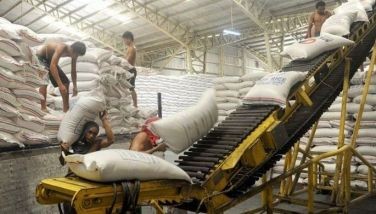IRRI developing rice variety for water scarce areas
November 1, 2002 | 12:00am
The International Rice Research Institute (IRRI) is developing a promising high-yield "aerobic rice", variety that could be grown in water-scarce irrigated and non-irrigated areas.
T.P. Tuong, water management engineer at the IRRI said that initial field testing of at least three to four varieties of aerobic rice show encouraging results.
"The yields are at least 20 percent higher compared with conventional rice varieties grown in irrigated rice fields," said Tuong who holds a doctorate in Soil and Water Engineering from the University of Canterbury, New Zealand.
"The farmers and irrigation system managers in our pilot sites are enthusiastic about the results and we hope that we could expand our activities to new sites," said Tuong.
IRRI’s research on the commercial production possibilities of aerobic rice has been field-tested in selected sites in Luzon, such as in water-scarce rice farms in Tarlac and Nueva Ecija.
Tuong said that if further field tests show the same encouraging results, it is likely that commercial production of aerobic rice will not be far off.
IRRI said that growing aerobic rice as an upland crop like wheat on non-flooded, aerobic soils promises substantial water savings – eliminating seepage and percolation, while greatly reducing evaporation.
Currently, Asian farmers already grow rice aerobically with minimal inputs in the aerobic soils of upland environments, but only as a low-yielding subsistence crop. Evidence for the feasibility of aerobic rice comes from northern China where breeders produced varieties with an estimated yield potential of six to seven metric tons per hectare, and from Brazil, where irrigated upland rice produces yields averaging three metric tons per hectare.
In Asia, no rice varieties have yet been bred specifically for high-input aerobic systems, but several varieties tested at IRRI have produced yields of five metric tons per hectare in researcher-managed trials.
"We approach aerobic rice mainly as an attractive crop to realize high yields in water-scarce irrigated lowlands, but we also anticipate spillover benefits for rice farmers in rainfed lowlands and relatively favorable rainfed uplands," said Tuong.
Aside from aerobic rice, IRRI is also promoting other water-saving means to grow rice in the Philippines.
Together with Philippine Rice Research Institute, IRRI is also advocating alternative water-saving systems such as "direct dry seeding" and "alternative wetting and drying." Such systems can save 10 to 30 percent water, and if properly managed, maintain yields the same level as conventional flooded rice.
"After field testing, we are confident that a number of these technologies are ready to help out to farmers in water-scarce areas," said Tuong.
Direct seeding was done at the upper Pampanga irrigation system and also at the Angat and Magat dam systems.The alternative wetting and drying method is now widely adopted in Iloilo.
With the specter of a global water crisis, Tuong said finding new means to plant rice using substantially less water is critical.
Rice is a water-consuming crop. It requires two to three times more water to produce a kilogram of rice than other cereals such as corn or wheat. In Asia, agriculture accounts for about 90 percent of all fresh water used, and more than half of this is used to irrigate rice.
Traditionally, rice has been grown in areas of plenty of water and this was not a problem. But now water scarcity is a serious problem in many parts with Asia, such as vast areas in north China, and north and west India, the Philippines and many other countries.
T.P. Tuong, water management engineer at the IRRI said that initial field testing of at least three to four varieties of aerobic rice show encouraging results.
"The yields are at least 20 percent higher compared with conventional rice varieties grown in irrigated rice fields," said Tuong who holds a doctorate in Soil and Water Engineering from the University of Canterbury, New Zealand.
"The farmers and irrigation system managers in our pilot sites are enthusiastic about the results and we hope that we could expand our activities to new sites," said Tuong.
IRRI’s research on the commercial production possibilities of aerobic rice has been field-tested in selected sites in Luzon, such as in water-scarce rice farms in Tarlac and Nueva Ecija.
Tuong said that if further field tests show the same encouraging results, it is likely that commercial production of aerobic rice will not be far off.
IRRI said that growing aerobic rice as an upland crop like wheat on non-flooded, aerobic soils promises substantial water savings – eliminating seepage and percolation, while greatly reducing evaporation.
Currently, Asian farmers already grow rice aerobically with minimal inputs in the aerobic soils of upland environments, but only as a low-yielding subsistence crop. Evidence for the feasibility of aerobic rice comes from northern China where breeders produced varieties with an estimated yield potential of six to seven metric tons per hectare, and from Brazil, where irrigated upland rice produces yields averaging three metric tons per hectare.
In Asia, no rice varieties have yet been bred specifically for high-input aerobic systems, but several varieties tested at IRRI have produced yields of five metric tons per hectare in researcher-managed trials.
"We approach aerobic rice mainly as an attractive crop to realize high yields in water-scarce irrigated lowlands, but we also anticipate spillover benefits for rice farmers in rainfed lowlands and relatively favorable rainfed uplands," said Tuong.
Aside from aerobic rice, IRRI is also promoting other water-saving means to grow rice in the Philippines.
Together with Philippine Rice Research Institute, IRRI is also advocating alternative water-saving systems such as "direct dry seeding" and "alternative wetting and drying." Such systems can save 10 to 30 percent water, and if properly managed, maintain yields the same level as conventional flooded rice.
"After field testing, we are confident that a number of these technologies are ready to help out to farmers in water-scarce areas," said Tuong.
Direct seeding was done at the upper Pampanga irrigation system and also at the Angat and Magat dam systems.The alternative wetting and drying method is now widely adopted in Iloilo.
With the specter of a global water crisis, Tuong said finding new means to plant rice using substantially less water is critical.
Rice is a water-consuming crop. It requires two to three times more water to produce a kilogram of rice than other cereals such as corn or wheat. In Asia, agriculture accounts for about 90 percent of all fresh water used, and more than half of this is used to irrigate rice.
Traditionally, rice has been grown in areas of plenty of water and this was not a problem. But now water scarcity is a serious problem in many parts with Asia, such as vast areas in north China, and north and west India, the Philippines and many other countries.
BrandSpace Articles
<
>
- Latest
- Trending
Trending
Latest
Trending
Latest
Recommended






























